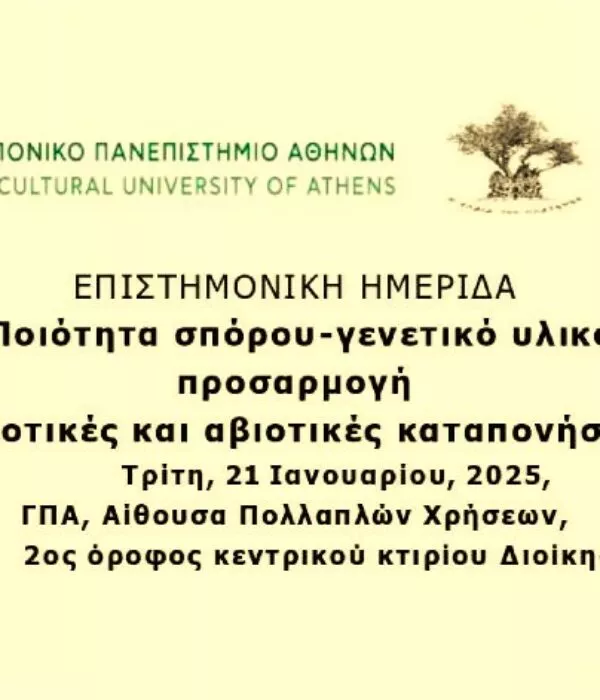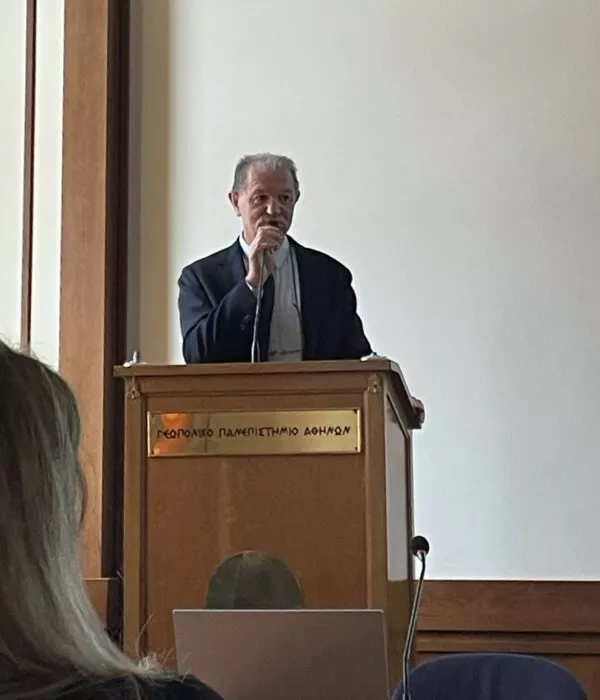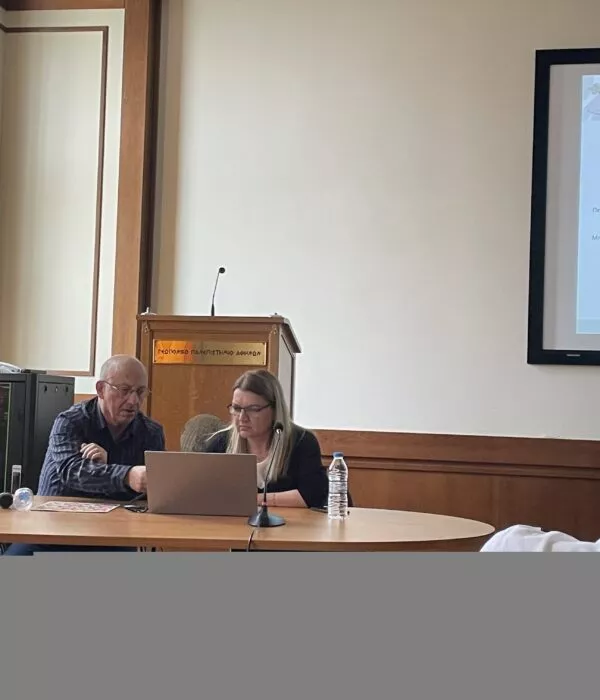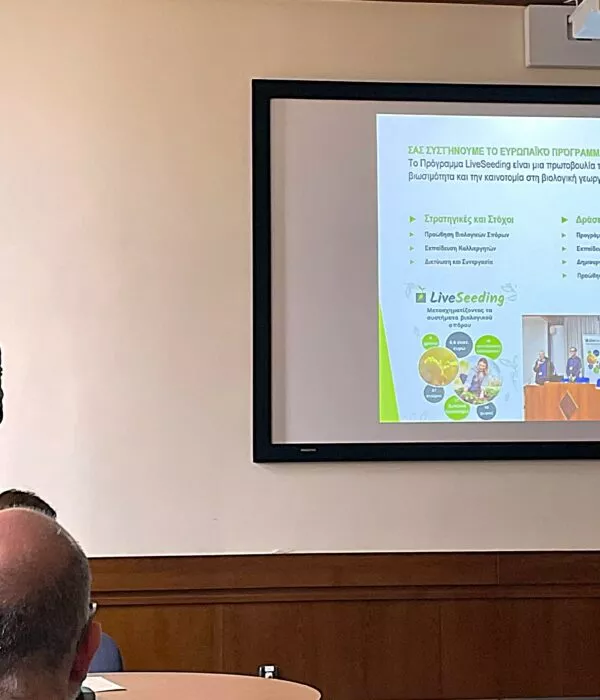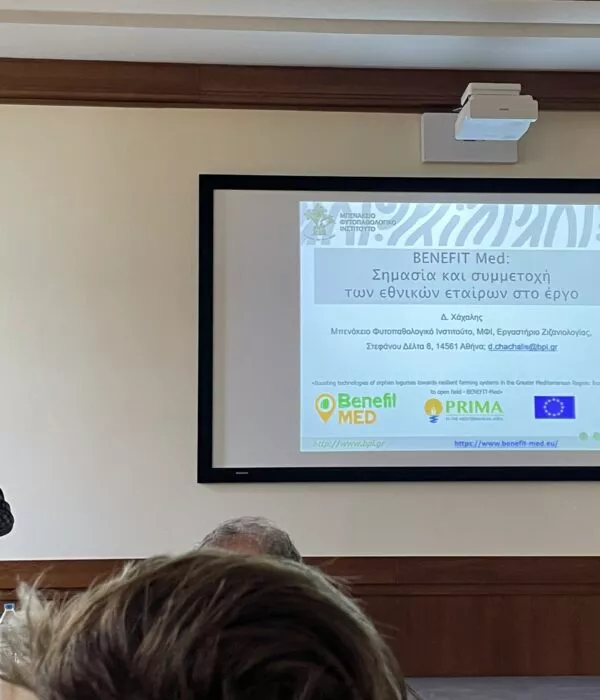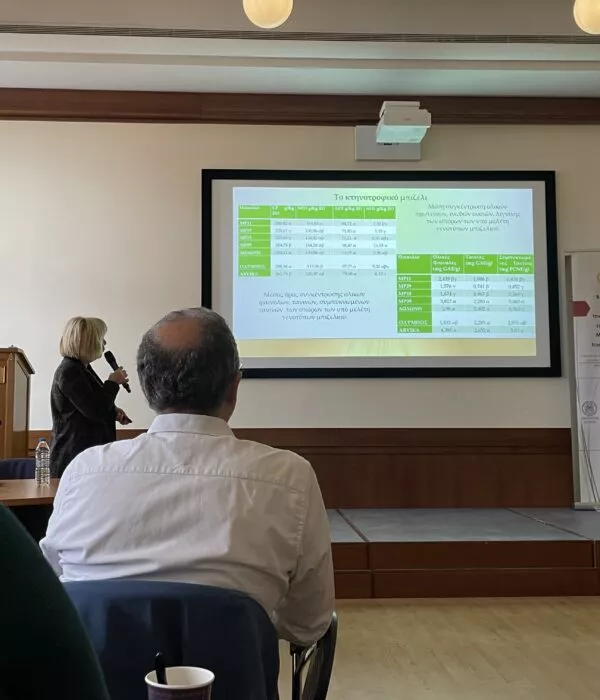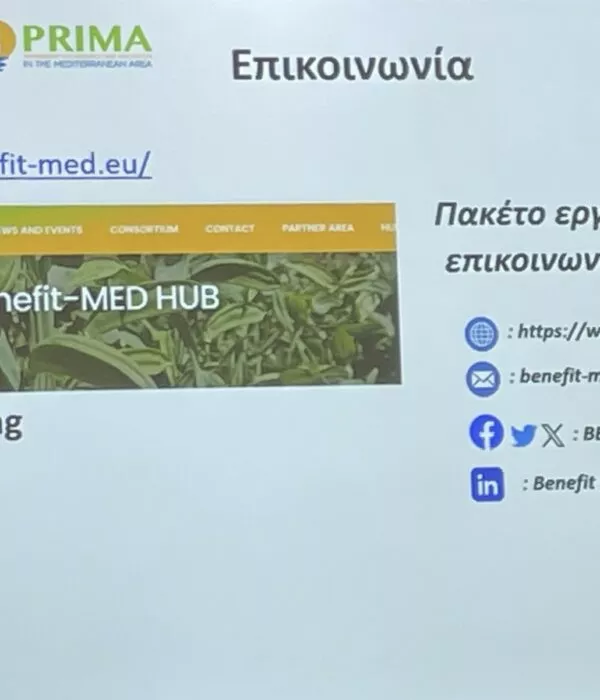Blog
OIKOS SEEDS at the Agricultural University of Athens
On January 21, 2025, a scientific conference was held at the Agricultural University of Athens on the topic “Seed Quality – Genetic Material: Adaptation to Biotic and Abiotic Stresses.” The Dean, Professor Dr. Savvas Dimitris, delivered the opening address. OIKOS SEEDS had the honor and pleasure to participate through Georgios Kostakis.
Speakers and Topics
- Eleni Tani & Dimosthenis Chahalis: “Presentation of the BENEFIT Med program: The importance and participation of national partners in the project.”
- Maro Goufa: “Effect of seed preparation technologies on plant growth under saline stress conditions in grass pea (Lathyrus sativus L.) – BENEFIT Med Program.”
- Angeliki Petraki: “Utilization of seed biopriming technology in legumes: Field experiments – BENEFIT Med Program.”
- Eleni Avraam: “Evaluation of grain legume varieties as alternative protein sources in animal production.”
- Panagiotis Oikonomou: “New data and technologies in the production of genetic material for large-scale crops.”
- Giorgos Kontosfyris: “Evolution and adaptability of vegetable crop hybrids under stress conditions.”
- Giorgos Kostakis: “Approach to European Policy on Organic Agriculture, aiming at the preservation and promotion of Greek traditional vegetable varieties – LIVESEEDING Program.”
Key Points of the Presentation
Our presentation, titled “Approach to European Policy on Organic Agriculture, aiming at the preservation and promotion of Greek traditional vegetable varieties – LIVESEEDING Program,” focused on key issues such as:
- The history and vision of OIKOS SEEDS in preserving traditional varieties.
- Our contribution to the development of domestic seed production and sustainable agriculture.
- Our participation in the European LIVESEEDING program.
- The challenges and opportunities facing Greek seed production in a constantly evolving agri-food landscape.
The LIVESEEDING Program
Special emphasis was placed on OIKOS SEEDS’ participation in the LIVESEEDING program, which:
- Aims to create sustainable local food systems through the development of organic seeds.
- Supports the adaptation of traditional varieties to modern agricultural needs.
- Strengthens collaboration between farmers, researchers, and policymakers to promote organic farming.
Excerpts from the Speech
“At this point, allow me to take a brief look into the past.”
Let’s go back to 1990. It was a time when traditional seed varieties were at a critical crossroads. Their value was being questioned as hybrids had already established themselves as the dominant choice. With advantages such as high yields, disease resistance, and uniformity, hybrids became the preferred option for most producers.
However, this prevailing narrative came at a significant cost. Flavor quality, aroma, and connection to tradition began to decline. Consumers started expressing dissatisfaction with the “bland” taste of these products, longing for the authentic flavors of the traditional varieties they had once enjoyed.
Today, the consequences of this shift are more apparent than ever.
Taste loss has been accompanied by another, less visible but equally critical loss: biodiversity. Traditional varieties, adapted to local conditions and climates over years of natural selection and human cultivation, were gradually replaced by a few uniform hybrid varieties, leading to the loss of valuable genetic resources.
35 years later, our world faces new critical challenges:
- Climate change demands the adoption of resilient and adaptive crops.
- Biodiversity loss threatens the stability of entire ecosystems.
- The need for sustainable agricultural practices is more urgent than ever.
In this context, traditional varieties are reclaiming their place. Protecting biodiversity is not just nostalgic; it’s a strategic investment for the future.
Traditional varieties:
- Preserve biodiversity by maintaining genetic material better suited to climate changes.
- Promote sustainability, often requiring fewer inputs such as water, fertilizers, and pesticides.
- Support environmental health by reducing reliance on intensive agricultural practices.
The Role of Greece in Seed Production
Greece faces significant challenges in seed production. Limited domestic production increases dependency on imports, which can impact national food security. Food security depends on a country’s ability to provide sufficient and safe food for its population. A lack of domestic seed production may lead to vulnerabilities in the face of international crises, such as supply chain disruptions or price fluctuations.
Enhancing domestic seed production is critical to reducing reliance on imports and strengthening food security. The development and preservation of traditional varieties adapted to local conditions can contribute to sustainable agriculture and biodiversity protection. Moreover, promoting local seed production can boost the rural economy and create new employment opportunities.
Consumer Demand and Tourism Impact
Today, consumers are turning towards authenticity. High gastronomy and local production highlight traditional varieties as an essential part of a new dietary approach.
Tourism, a key growth sector for Greece, also benefits. Visitors seek authentic experiences, coming to Greece not only for its unique landscapes but also to savor the traditional flavors that define each region.
The Connection with LiveSeeding
The LiveSeeding program is an innovative European initiative promoting organic seed development and plant improvement, aiming at a transition to more sustainable local food systems.
Funded by the EU, SERI, and UKRI, with 37 partners across 16 European countries, LiveSeeding has achieved significant results, such as:
- Pilot cultivation programs in LIVING LABS with farmers.
- Training and capacity building initiatives.
- Creation of local and international cooperation networks.
- Influencing EU policies on organic farming.
Through our participation in LiveSeeding, we contribute to:
- Developing new Greek varieties.
- Reducing chemical and pesticide use.
- Improving the quality of organic production.
Conclusions
“9 out of 10 bites of food start with seeds!”
Seeds are the foundation of nearly all food, making certified seeds crucial for ensuring food quality. At OIKOS SEEDS, we are committed to continuing our work, combining agriculture with environmental protection, sustainability, and producer support.
Preserving and promoting traditional varieties is a matter of cultural and gastronomic heritage, as well as environmental responsibility. It’s not just a return to the past, but a strategic step for the future.
Stay tuned for more updates and actions on the OIKOS SEEDS blog!







